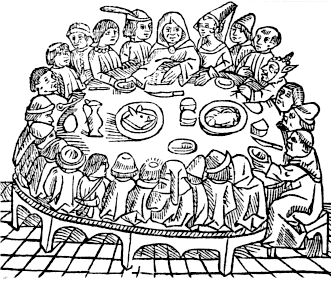It happened today - April 17, 2016
 So this is when all that “Whan that aprill with his shoures soote/ The droghte of march hath perced to the roote” got started. Yes, it’s the Canterbury Tales, which I’m sure you knew. And it was on April 17th with its shoures soote that the author, Geoffrey Chaucer, first told them at the court of Richard II in 1397. A very English event… and not just because Chaucer’s verse and prose have struck fear into the hearts of English majors ever since.
So this is when all that “Whan that aprill with his shoures soote/ The droghte of march hath perced to the roote” got started. Yes, it’s the Canterbury Tales, which I’m sure you knew. And it was on April 17th with its shoures soote that the author, Geoffrey Chaucer, first told them at the court of Richard II in 1397. A very English event… and not just because Chaucer’s verse and prose have struck fear into the hearts of English majors ever since.
Chaucer’s masterpiece adds another feather to Richard’s cap along with the great hammerbeam roof in Westminster Hall. For a grand total of two feathers. He was an awful king even if he does seem to have had exquisite taste. He made Chaucer became Controller of Customs and Justice of Peace in 1386 and then Clerk of the King's work in 1389, employment which allowed him to write his famous Tales. But it wasn’t a sinecure; he was evidently a talented bureaucrat, courtier and diplomat as well as an author. And his development and telling of the Tales at court isn’t just noteworthy if you have to try to decipher them.
The Canterbury Tales, as I’m sure you know, are told by a group of pilgrims on their way from London to Canterbury to visit the shrine of Thomas a Becket in that happy period between Henry II having Becket murdered and Henry VIII destroying his shrine and his bones. So in that sense they reflect conventional behaviour and piety. But they are a sharp satire on English society including religious hypocrisy. The Summoner and Pardoner are especially unattractive characters, though the Monk and one of the nuns aren’t about to be canonized either.
The Tales also reflect a kind of social fluidity and lack of deference that are characteristically English. Despite cheap laughs at the upper class that you can still get today, and not all of which are unjustified, the social equality famously prized in the United States and Canada have their roots in the mother country like so much else that we value which doesn’t include Middle English spelling and pronunciation.
Of course if you’d been there in 1397 it would all have been like contemporary slang or whatever and like you know man how people talked like then. And for what it’s worth, my opinion is that it was a considerably more appealing way of talking. Even “Whan zephirus eek with his sweete breeth”.